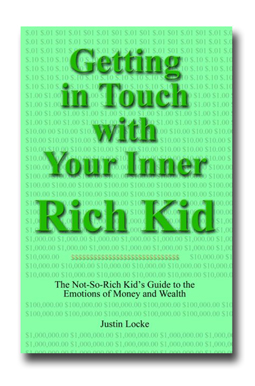In my latest book, “Getting in Touch with Your Inner Rich Kid,” I present the differences between the cultures of poor kids and rich kids. These are based mostly on my own first hand experience, of living in a poor kid world and a truly poor kid school, then abruptly finding myself in a fancy private rich kid school.

However, some people in my audiences have thrown me a curve ball. They say they are middle class kids, neither rich nor poor. Interesting. I confess, I went from one extreme to another. I never attended a middle class kid school.
So this needs some clarification, as there are many stereotypes about what is to be poor and/ or rich.
When I talk about rich and poor, I am not talking about having or not having money. Having money is a symptom of wealth, but it is not the cause. I once asked a bigtime money manager to define “wealth.” I was expecting him to give me a number. Instead, he said, in all seriousness, “it means different things to different people.”
In writing this book I wanted to try and define what wealth really is, and how money follows the energy of desire and believing that you can have what you want.
So when it comes to middle class kids, I think a lot of them don’t realize that they are actually “rich” kids, in that they had what they wanted as children. No yachts perhaps, but they had the core things all little kids want: no major anxieties about whether they would get fed today or not, generally safe from any violence, and perhaps more than anything else, they had a stable family environment, with two parents who were calm and sober most of the time. As I state in the book, interpersonal connection is the thing we want more than anything else. If you have that, right off you are a rich kid.
So if these kids are already rich, why should they read the book?
Being poor is a culture which, as I have now discovered, has very clear attributes. As we see the middle class shrinking, as we see people desperate to find a job, this is not some random “business cycle.” What we are seeing is a manifestation of poverty thinking. The banking crisis is not an issue of a tsunami washing the money out to sea. It’s about things like people seeing wealth as having more than someone else, it’s about creating anger and fear and mistrust to acquire some quick monetary gain at the expense of community cohesion. Having lived in poverty, I know how easy it is for people to embrace “poverty thinking” in response to momentary scarcity or fear. It looks like a pragmatic fix but it just makes things worse.
So as we discuss fixes for our economic woes, we can consider mechanical tricks like stimulus packages and “quantitative easing,” but at the heart of it, if you study the science of poverty thinking, you will see the emotional underpinnings at work, for good or for ill. Fix those, and the money will follow.
The main thing about my book is to show how these opposing positive/negative emotional energies lead to positive or negative outcomes. When you study the attributes of “poverty thinking” in my book you will become aware of these yourself, and you will be less likely to be affected by them.
So to all you middle class “rich kids,” I feel compelled to say, “don’t take it for granted.” There is far too much complacency in the middle class, of taking their collective wealth for granted. Historically, “middle classes” in societies are rare and momentary. Don’t let yourself get turned into a poor kid. Learn to recognize the telltale signs of poverty thinking.
© Justin Locke
